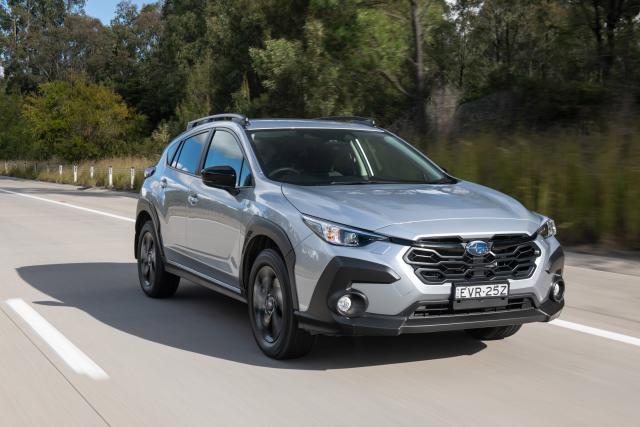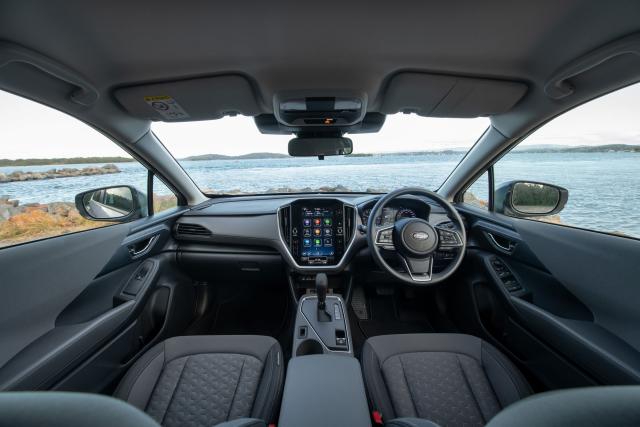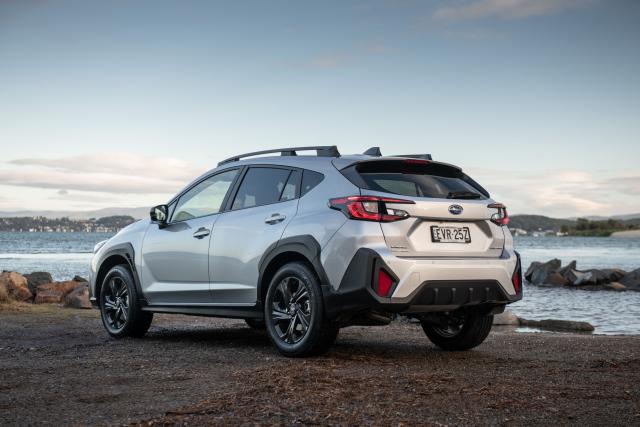‘Haven’t we met somewhere before?’ sprung to mind on my first encounter with the Subaru Crosstrek, for there is a lot in common here with the company’s XV sport utility vehicle.
In fact, says Subaru, the newly named compact is the latest iteration of the popular XV, including two petrol / electric hybrid models, aimed at anyone who wants a versatile, reliable, and stylish small SUV.
Priced from $34,990, the all-wheel drive Crosstrek comes in five variants – AWD 2.0L, AWD 2.0R, AWD 2.0S, AWD Hybrid L and AWD Hybrid S – offering those with an active lifestyle a versatile, reliable, and stylish small SUV.
However, there is a major point of difference between the Crosstrek and its antecedent. The Crosstrek has benefitted greatly from a visit to the doctor – a whole team of medics, in fact. Subaru collaborated with a medical school to study the structure of the human body and what causes driver discomfort, fatigue and lower back pain behind the wheel.
Results found ride comfort is not solely affected by the vibration of the vehicle, but also by sounds and changes in visual information because of jerking and head swaying during driving.
Hence seats have been redesigned to reduce shaking of the head and roof damping has been improved to help reduce sound pressure fluctuations in the cabin.
Meanwhile, vehicle health is in the hands of Subaru’s standard five-year / unlimited kilometre warranty and 12 months complimentary Subaru Roadside Assistance.
The mid-range Crosstrek AWD 2.0R, selling for $38,490, plus on-road costs, was the test vehicle for a week and confidently took on widely varied road and weather conditions well during that time.
STYLING
Once the domain of predominantly white or silver exteriors, or in this case ‘Subaru blue’, these days, subtle shades of colour are taking to streets around the world. Take for example the test Crosstrek with its Magnetite Grey Metallic paint job and dark machine finished 18-inch wheels. Who would have thought ‘dull’ could look so classy?
While the all-round appearance of the Crosstrek is generally a carry-over from the XV, the bonnet and radiator grille come in for a complete redesign, the latter maintaining the signature hexagonal shape, but in a larger more aggressively styled honeycomb.
Use of lightweight aluminium enables a newly designed bonnet to contribute to improved pedestrian protection with a softer head impact zone and a saving of two kilograms in front fenders optimises weight distribution all round.
LED headlamps, plus cornering lights, improve visibility at night and add to power savings, while LED rear combination lamps feature a sharp 3-D C-shape. Rear-view mirrors are smaller, improving aerodynamics and presenting a less obstructive view.
INTERIOR
The ‘doctors’ orders’ seats, clothed in premium material, provide exceptional comfort during longer drives (try 200-plus kilometres as we did), while leaving ample room for passengers to stretch out and relax.
Standard roof rails top off generous storage possibilities. However, a cramped cargo compartment weighs in at a stingy 291 litres with the rear seat backs up, and a maximum of 1278 litres with them folded. Under the floor sits a temporary spare wheel.
INFOTAINMENT
A fourth-generation infotainment system features, in the central dash, a large high-definition 11.6-inch portrait tablet-style touchscreen focusing on entertainment, vehicle information and control switches within the centre display. Gone is the instrument strip atop the dashboard, duplicating many of the functions displayed directly in front of the driver.
All Crosstreks feature full wireless Apple CarPlay and wired or wireless Android Auto connectivity, as well as AM, FM and Digital Radio, while WD 2.0L, 2.0R and Hybrid L come with a high-quality six-speaker system with 160 mm full range speakers in both the front and rear doors, as well as tweeters in the front instrument panel. Buyers can ‘turn up’ the sound with a premium harman / kardon system only in the AWD 2.0S and AWD Hybrid S variants.
A 2.4-amp Type-A and one 3-amp Type-C USB port are located in front of the gearshift to power mobile devices. Two additional power supply USB ports are also provided for rear passengers at the back end of the centre console.
For the first time in a Subaru vehicle, wireless charging of smartphones and other devices is on hand through a centre console tray.
ENGINES / TRANSMISSIONS
The petrol-only Crosstrek variants are powered by an upgraded version of Subaru’s 2.0-litre direct injection FB20 four-cylinder horizontally opposed engine, delivering maximum power of 115 kW at 6000 rpm and top torque of 196 Nm 4000 revs.
An upgraded continuously variable transmission with more than 80 per cent new components compared with the previous generation XV, results in improved drivability. Best fuel consumption on test was a whisker under 5 litres per 100 kilometres. A combined 7.2 litres per 100 kilometres is claimed by the maker.
SAFETY
Crosstrek benefits from Subaru’s commitment to achieving no fatal road accidents in any of its vehicles by 2036 through the four pillars of primary, active, preventive and protective safety.
These already include advanced vehicle dynamics control with electronic stability control, anti-lock braking, electronic brake force distribution, brake assist, traction control, active torque vectoring, a brake override and limited slip devices. Much more, no doubt, is on the way.
DRIVING
For some reason, the Boxer engine, on occasions, had some difficulty in settling when first accelerating, with a resulting surge in revs. A warmed-up motor showed no such stress.
At low-speed throttle openings, gear change is infinitely variable as in a conventional CVT, but at higher throttle openings it automatically adopts an eight-speed step control, creating a more conventional sound and feeling of acceleration, as well as holding engine speed higher for a sportier and more satisfying drive.
With its hallmark all-wheel drive system in full action, the Crosstrek handled some extreme wet weather on test, resulting in a smooth stable ride and confident handling. Not so positive was the driver monitoring system, which was able to give far from 100 per cent accuracy with its observations on distraction.
Front and rear springs and dampers have been retuned and optimised for improved ride comfort and driving stability, while recalibrated coil spring rates result in improved road bump absorption and body movement control.
Class-leading ground clearance of 220 mm encourages trips off the bitumen with rough rutted roads holding little angst for the driver. All variants feature X-Mode, a system that operates below 40 km/h and has two modes to take on deep snow and mud, or snow and dirt.
Hill Descent Control (under 20 km/h) helps maintain the speed the vehicle is travelling at on taking the foot off the gas or braking to allow the driver to fully concentrate on steering. This operates in forward or reverse.
SUMMARY
It seems the Crosstrek refuses to let go of the past completely with styling cues to the XV. However, there is no lagging with upgrades to tech and comfort but the underpowered engine performance has not managed to keep up.



















